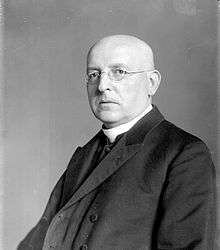1927 Austrian legislative election
Parliamentary elections were held in Austria on 24 April 1927.[1] The result was a victory for the Unity List (Einheitsliste), an alliance of the Christian Social Party and the Greater German People's Party, which won 85 of the 165 seats. However this brief coalition failed to result in any larger proportion of the votes than when the CSP ran alone, losing votes to the Landbund. [2] Voter turnout was 89.3%.[3]
| |||||||||||||||||||||||||||||||||||||||||
165 seats in the National Council of Austria 83 seats needed for a majority | |||||||||||||||||||||||||||||||||||||||||
|---|---|---|---|---|---|---|---|---|---|---|---|---|---|---|---|---|---|---|---|---|---|---|---|---|---|---|---|---|---|---|---|---|---|---|---|---|---|---|---|---|---|
| |||||||||||||||||||||||||||||||||||||||||
| |||||||||||||||||||||||||||||||||||||||||
| This article is part of a series on the |
| Politics of Austria |
|---|
 |
|
|
|
|
|
|
|
Results
| Party | Votes | % | Seats | +/- |
|---|---|---|---|---|
| Unity List | 1,756,761 | 48.2 | 85 | – |
| Social Democratic Party | 1,539,635 | 42.3 | 71 | +3 |
| Landbund for Austria | 230,157 | 6.3 | 9 | +4 |
| Udeverband - Association against Corruption | 35,471 | 1.0 | 0 | New |
| National Socialist Bloc | 26,991 | 0.7 | 0 | New |
| Communist Party of Austria | 16,119 | 0.4 | 0 | 0 |
| Democratic List | 15,112 | 0.4 | 0 | 0 |
| Jewish Party | 10,845 | 0.3 | 0 | 0 |
| Party of the Carinthian Slovenes | 9,334 | 0.3 | 0 | 0 |
| Nazi Party | 779 | 0.0 | 0 | New |
| Austrian Small Business Party | 251 | 0.0 | 0 | New |
| Association of Independent Citizens | 60 | 0.0 | 0 | New |
| Farmers and Traders of All Types Party | 11 | 0.0 | 0 | New |
| Invalid/blank votes | 35,907 | – | – | – |
| Total | 3,677,433 | 100 | 165 | 0 |
| Registered voters/turnout | 4,119,626 | 89.3 | – | – |
| Source: Nohlen & Stöver | ||||
gollark: Ügh, yes, very much so.
gollark: I might have at some point, my long term memory is apiological, but not *recently*.
gollark: Nope!
gollark: Also, my program no longer crashes unfathomably.
gollark: His name is apparently John Rutter.
References
- Dieter Nohlen & Philip Stöver (2010) Elections in Europe: A data handbook, p196 ISBN 978-3-8329-5609-7
- Nazism and the Working Class in Austria: Industrial Unrest and Political Dissent in the National Community. Timothy Kirk. Cambridge University Press, 2002. ISBN 9780521522694
- Nohlen & Stöver, p213
This article is issued from Wikipedia. The text is licensed under Creative Commons - Attribution - Sharealike. Additional terms may apply for the media files.

_1919_WIZ_C._Pietzner.png)


